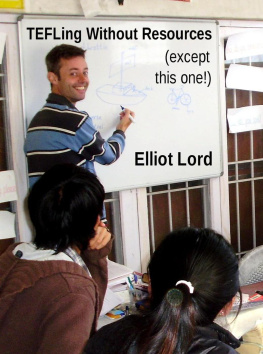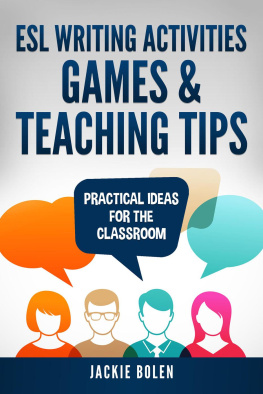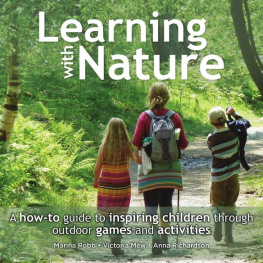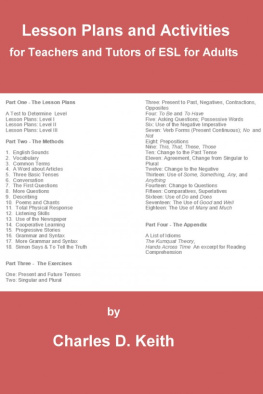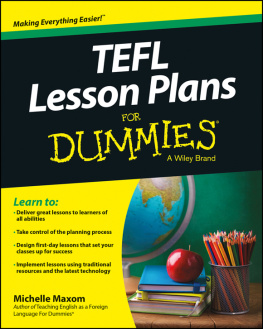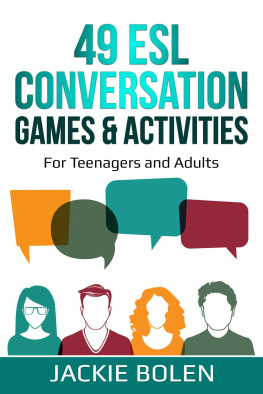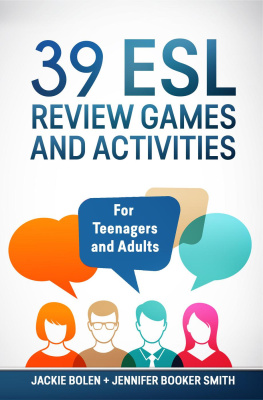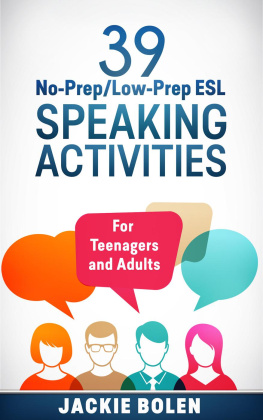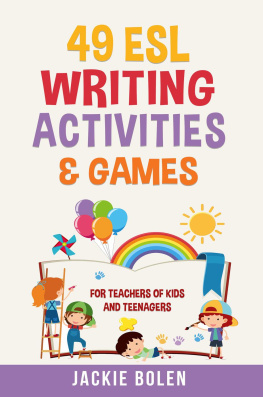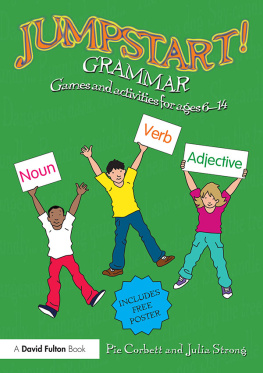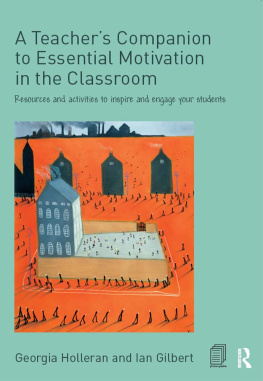TEFLing Without Resources (except this one!) 2012 Elliot Lord Contents
. Introduction Grammar Presentations 8. Can (ability) - Pre-Int 9. Comparatives and Superlatives Pre-Int 10. First Conditional - Pre-Int 11. Future Continuous Upper-Int 12.
Question Forms - Pre-Int 13. Question Tags Pre-Int/ Int 14. Reported Statements Pre-Int/ Int 15. Second Conditional - Pre-Int 16. Subject/ Object Questions - Pre-Int 17. Used to (past use) - Pre-Int Follow-up Activities 19.
Future Continuous Upper-Int 20. Future Perfect Upper-Int 21. Modal Verbs of Deduction - Int 22. Passive forms - Pre-Int 23. Past Simple/ Continuous Elem/ Pre-Int 24. Present Perfect Continuous Pre-Int > 25.
Present Perfect Games (1st use) Pre-Int > 26. Present Perfect vs. past tenses Pre-Int > 27. Relative Clauses - Pre-Int 28. Relative Clauses Int > 29. Reported Commands Int > 30.
Second Conditional (various) - Pre-Int 31. Should (advice) - Pre-Int 32. Subject Questions Pre-Int > 33. Third Conditional - Upper-Int 34. Will: predictions - Pre-Int Vocabulary Activities 36. Adjectives (-ed/ -ing) Int > 37.
Opposites - any 38. Phonetic Symbols Chart Elem > 39. Prefixes and Suffixes Int > 40. Prepositions of Movement - Pre-Int 41. Prepositions of Place - Pre-Int 42. Prepositions of Time Elem > 43.
Similar Words Chart Elem > 44. Telling the Time - Elem 45. Turn About (game show) Pre-Int > Games 47. Alphabet Race Pre-Int > 48. Count Down Pre-Int > 49. The Four Categories Pre-Int > 50.
Mallet's Mallet Int > 51. Question forms/ vocabulary games (various) Elem > 52. Rizla Game Elem > 53. Short Answers Pre-Int > 54. Simon Says: various uses Elem > 55. Taboo Int > 56.
Various questioning games Pre-Int > 57. Win, Lose or Draw Elem > 58. Wipe Out - Int 59. Word Expansions Int > 60. Word Puzzle Pre-Int > 61. More vocabulary games Pre-Int > Miscellaneous 63.
Consequences Int > 64. Conversations Int > 65. Descriptions Int > 66. Human Substitution Table - any 67. Improvised Stories Pre-Int > 68. Lateral Thinkers Int > 70.
Mad Debates Int > 71. Phrasal Verb Revision Pre-Int > 72. Revising Past Simple, etc. (Wipe Out II) Elem > 73. Running Dictations Pre-Int > 74. Teach them gambling! - Elem > 75.
Tongue Twisters any 77. The X Files Pre-Int > 77. Songs With Learning Objectives 78. Songs For Children
I ntroduction This book developed from ideas I had when I taught English as a Foreign Language. Sometimes I wanted to do something more interesting or more fun than what was in the course books. Some things were inspired by other colleagues or things like TV game shows.
Over time, I'd come up with a notebook full of lesson plans that were fun and effective and required minimal preparation. None of us likes spending hours writing or cutting out things for something that's only going to last for 15 minutes so the underlying principle was to produce good quality lessons from almost nothing. This will also make it a useful book if you are working somewhere where it's difficult to get hold of resources easily. It will also help newer teachers with developing their creativity. In subsequent years, my notebook was often used by less-experienced colleagues so I knew the lessons were regarded well. I later put them on a website called 'TEFLers of the World Unite' but the price of the hosting made me decide to call it a day after a couple of years.
Many years later, I remembered what I had and decided to make it into a book. The lessons here are to be used along with course books or to provide alternatives if you don't like the way some things are presented. I hope that you get as much from the lessons as I did and that they inspire you to come up with many more ideas that don't need any or many resources. Nb. You will actually see in some of them that you do need some things, but it's often just a few pieces of paper or objects in the classroom! It is also assumed that you have a pen and a board or something to that effect! Disclaimer over... ;)
N otes on the terminology used: In terms of the levels, I used to use the Headway course books and used their level system.
In ascending order, they are as follows: Elem - Elementary/ Beginners Pre-Int Pre-Intermediate Int Intermediate Upper-Int Upper Intermediate At the time, I didn't teach advanced levels so sorry that I don't have any lesson plans for that area. Cover photo: Elliot teaching to Tibetan students in northern India, early 2012 Elliot Lord, May 2012
. Can (ability) - Pre-Int 9. Comparatives and Superlatives Pre-Int 10. First Conditional - Pre-Int 11. Future Continuous Upper-Int 12.
Question Forms - Pre-Int 13. Question Tags Pre-Int/ Int 14. Reported Statements Pre-Int/ Int 15. Second Conditional - Pre-Int 16. Subject/ Object Questions - Pre-Int 17. swim/ fly/ speak French/ play volleyball). swim/ fly/ speak French/ play volleyball).
Mime them if anyone is unsure what they mean. Ask students individually if they can do one of the things to tick or cross on the chart. Write up the short answers for them to say (Yes, I can/ No, I can't). They should understand the meaning, even though it may not translate into their first language(s). For remaining cells on chart, students go round asking each other. wiggle their ears). wiggle their ears).
They can then write some sentences to consolidate. Comparatives and Superlatives Bigger, more interesting/ the biggest, the most interesting Level: Pre-Int Age Range: 11> Class Organisation: whole class Time: 30 mins Resources: none Description: Using categories such as instruments, animals, transport or countries, write up 5 examples of one of these. Using hand mimes, demonstrate that you are talking about size differences. Elicit from students if something is bigger or smaller than the first item you highlighted. Use this to form the comparative structure (e.g. Australia is bigger than Belgium).
Write words 'bigger' and 'smaller' on the board to help students say sentences modelled by you. When they can say them, write the whole sentence up for the students to use as a model for them to write their own sentences. Then, go on to different categories and adjectives to show differences (-er/ -ier/ more...) Use a similar method to teach the superlatives (the ...est). First Conditional If I study hard, I will pass my exams. Level: Pre-Int> Age Range: 12> Class Organisation: whole class Time: 20 mins Resources: none Description: Draw a picture of a student at a desk, studying for exams. Consecutive thought bubbles containing: Maths: A, Biology: A/ Oxford Uni/ pound signs/ sports car/ happy face.
Ask students 'Who is this?', 'What is s/he thinking?', 'Is it possible?', 'When will it happen?' Use thought bubbles to form 1st conditional sentences (e.g. If s/he passes his/her exams, s/he will go to university). Write some sentences on board. Ask 'How do we form the 1st conditional?' (If+ present simple, will+ infinitive without 'to') Future Continuous I will be working tomorrow. Level: Upper-Int Age Range: 15> Class Organisation: pairs Time: 15 mins Resources: none Description: On the board, write: have a shower/ have breakfast/ work or study/ have lunch/ have dinner. Students write down times that they do these things.
Next page
